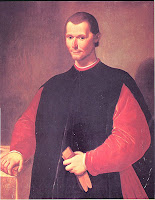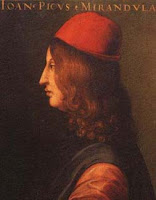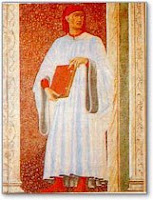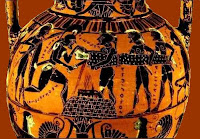On Thursday, May 1, at 7:30 p.m., Northern's Early Music Ensemble will perform as part of the Spring A Capella Concert. It looks to me like most or all of the pieces they'll be doing are from the Renaissance period, and I'd really like you to hear this music. The video I showed you really didn't do Renaissance music justice, and you'll get a *much* better feel for Renaissance achievements if you listen to our NSU musicians perform the pieces live.
For extra credit, you can get a program signed by any of the singers/musicians performing at the concert (or from Dr. Woods) and show me the signed program. Alternatively, you can describe here your impressions of the Renaissance pieces. What did you find impressive?
Wednesday, April 30, 2014
Monday, April 14, 2014
Machiavelli (Extra Credit)
 Please read Chapters 15-19 of Machiavelli's The Prince (either pp. 84-104 of the Signet edition or at the link below).
Please read Chapters 15-19 of Machiavelli's The Prince (either pp. 84-104 of the Signet edition or at the link below).Add a comment or two here giving your impressions of Machiavelli. Try to say something that would help another students trying to prepare on essay on Renaissance achievements.
http://www.fordham.edu/HALSALL/basis/machiavelli-prince.html
Pico della Mirandola (Extra Credit)
 Renaissance humanists had a very positive view of mankind. They greatly appreciated past human achievements, and had an exceptionally high view of human potential . Read through some of Pico della Mirandola's Oration on the Dignity of Man at the link below. Cite a line or two that particular well illustrates Pico's "humanism," i.e., either his appreciation for the past or his optimism about human potential. As an alternative, just cite a line that you particularly like from this work and explain why you like it.
Renaissance humanists had a very positive view of mankind. They greatly appreciated past human achievements, and had an exceptionally high view of human potential . Read through some of Pico della Mirandola's Oration on the Dignity of Man at the link below. Cite a line or two that particular well illustrates Pico's "humanism," i.e., either his appreciation for the past or his optimism about human potential. As an alternative, just cite a line that you particularly like from this work and explain why you like it.http://www.cscs.umich.edu/~crshalizi/Mirandola/
Boccaccio's Account of the Black Death (extra credit)
 Read Boccaccio's account of the plague in Florence at the link below. What can you tell about Boccaccio's values and concerns from this account? In what ways might seeing the kinds of things he describes affect his writing and his general view of life?
Read Boccaccio's account of the plague in Florence at the link below. What can you tell about Boccaccio's values and concerns from this account? In what ways might seeing the kinds of things he describes affect his writing and his general view of life?Heloise and Abelard (extra credit)
Choose one or two of the letters of Heloise and Abelard at the link here. What did you find particularly interesting in these letters? Does anything particularly surprise you?
Wednesday, February 26, 2014
Trojan Women (extra credit)
 Please read Euripides' Trojan Women either at the link here or (probably better) in Moses Hadas' Greek Drama (available at the bookstore).
Please read Euripides' Trojan Women either at the link here or (probably better) in Moses Hadas' Greek Drama (available at the bookstore).The Greeks regarded the words of their great playwrights as "theopneutos," i.e., God-breathed. Do you agree? Cite a line or two from the play that might show why the Greeks regarded writers like Euripides as almost equivalent to prophets and explain why you find this line/these lines inspired or inspiring. Do you see here a line worth committing to memory?
Monday, February 3, 2014
Daniel (extra credit)
 Please read Chapter 1-7 and Chapter 12 of Daniel. What do you see in the stories that might have helped Ancient Israel provide ethical guidance or emotional fulfillment? What do you see here that show something about how Ancient Israel taught the world "new ways to dream"?
Please read Chapter 1-7 and Chapter 12 of Daniel. What do you see in the stories that might have helped Ancient Israel provide ethical guidance or emotional fulfillment? What do you see here that show something about how Ancient Israel taught the world "new ways to dream"?
Subscribe to:
Posts (Atom)


